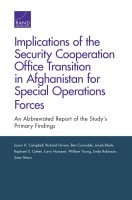| 来源类型 | Research Reports
|
| 规范类型 | 报告
|
| DOI | https://doi.org/10.7249/RR1201.1
|
| ISBN | 9780833096470
|
| 来源ID | RR-1201/1-SOJTF-A
|
| Implications of the Security Cooperation Office Transition in Afghanistan for Special Operations Forces: An Abbreviated Report of the Study's Primary Findings |
| Jason H. Campbell; Richard S. Girven; Ben Connable; Jonah Blank; Raphael S. Cohen; Larry Hanauer; William Young; Linda Robinson; Sean Mann
|
| 发表日期 | 2017
|
| 出版年 | 2017
|
| 页码 | 46
|
| 语种 | 英语
|
| 结论 |
Working with the Interagency: Country Team- Regular coordination with the country team is essential.
- Clear understanding among the country team of the various authorities that different elements are operating under prevents confusion and discord.
- Rapport and trust building within the country team can pay great dividends for special operations forces (SOF) equities.
- Space issues and limitations can be a limiting factor in certain instances.
Working with the Interagency: Stateside- A lack of precise and compatible strategic guidance to the ambassador and the SOF element can negatively affect planning within the country team.
- The activities of Washington agencies, such as the Pentagon and State Department, as well as the combatant commands, influence relationships within the country team.
Working with the Host Nation- A formal agreement with the host/partner nation specifically outlining rules of engagement and expectations can help avoid misunderstandings and operational difficulties.
- Building lasting bonds with host/partner-nation security officials can help smooth fluctuations in the bilateral relations between the governments.
- Shifting from Title 10 to Title 22 authorities can create added strain with host/partner-nation authorities, who may not understand the distinction and may not be content with the changes involved.
Working within the SOF Community- Staffing program managers in the Security Cooperation Office (SCO) who have knowledge of SOF requirements is a good complement to the typical SOF operational liaison assigned to an embassy.
- SOF personnel assigned to serve in an embassy should be provided appropriate predeployment training.
- Trade-offs between Title 10 and Title 22 authorities exist: While the former typically experience greater freedom of movement, the latter tend to have better access to embassy facilities, funding, and logistical support.
- The current cap on deployments for SOF personnel can make it difficult for personnel to mesh well with the rest of the country team.
|
| 主题 | Afghanistan
; Iraq
; Jordan
; Pakistan
; Philippines
; Security Cooperation
; Special Operations Forces
; Uganda
|
| URL | https://www.rand.org/pubs/research_reports/RR1201z1.html
|
| 来源智库 | RAND Corporation (United States)
|
| 引用统计 |
|
| 资源类型 | 智库出版物
|
| 条目标识符 | http://119.78.100.153/handle/2XGU8XDN/108535
|
推荐引用方式
GB/T 7714 |
Jason H. Campbell,Richard S. Girven,Ben Connable,et al. Implications of the Security Cooperation Office Transition in Afghanistan for Special Operations Forces: An Abbreviated Report of the Study's Primary Findings. 2017.
|
|
文件名:
|
x1501596583549.jpg
|
|
格式:
|
JPEG
|

|
文件名:
|
RAND_RR1201z1.pdf
|
|
格式:
|
Adobe PDF
|
除非特别说明,本系统中所有内容都受版权保护,并保留所有权利。